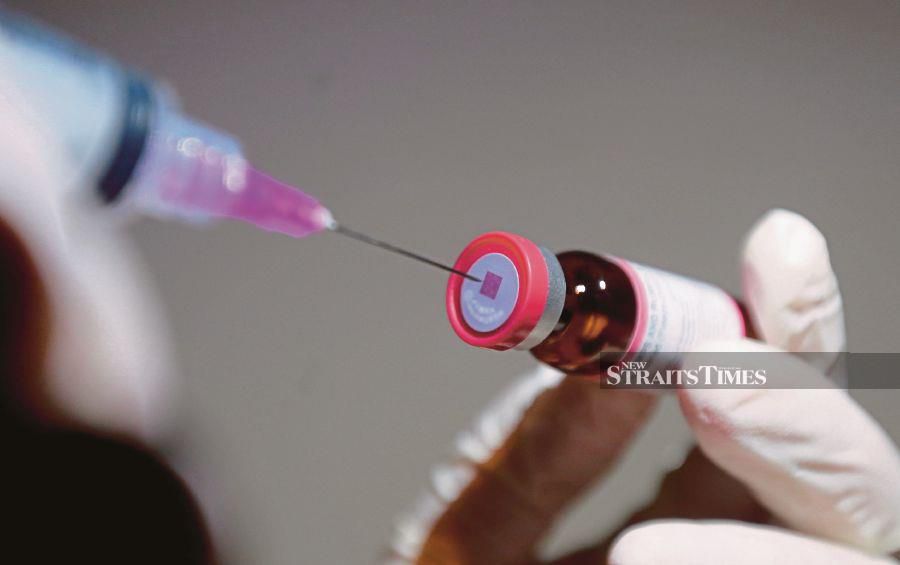Phase 3 crucial part of vaccine trial

December 7, 2020 @ 9:00am
KUALA LUMPUR: A phase 3 clinical test for a Covid-19 vaccine will generally be conducted in a random, double-blind, placebo-controlled and multi-centred manner.
Experts said this was crucial to determine the safety, tolerability and efficacy of the vaccine across a population.
They said this in response to the Health Ministry's announcement on Friday that a Phase 3 trial for a Covid-19 vaccine developed by the Institute of Medical Biology Chinese Academy of Medical Sciences in Beijing, China, would be conducted at eight clinical trial centres.
It is the first Covid-19 vaccine to enter a large-scale clinical trial in Malaysia. The trial, which is expected to begin at the end of the month or next year, would have about 3,000 participants.
Epidemiologist Datuk Dr Awang Bulgiba Awang Mahmud said any clinical trial would involve four main phases (Phases 1 to 4), and Phase 3, which looks at large sample sizes, would test whether a vaccine was efficacious and look for side effects.
"This is the last phase before an application is made to regulatory bodies for approval and before the vaccine can be marketed," he told the New Straits Times.
Dr Awang said because a vaccine worked to prevent rather than cure a disease, it would initially be given to volunteers without the disease.
The participants, he said, would be divided into two or more groups, where one group would be administered the vaccine, and the other a placebo (a harmless injection that looks like the vaccine).
He said to prevent bias, the vaccine and placebo would be randomly allocated so that the two groups should theoretically look very much the same as far as their characteristics were concerned.
"The volunteers receiving the vaccine or placebo, the personnel injecting the vaccine and placebo and even the persons assessing the outcome will not know which volunteer received vaccine or placebo.

Epidemiologist Datuk Dr Awang Bulgiba Awang Mahmud says because a vaccine works to prevent rather than cure a disease, it will initially be given to volunteers without the disease. FILE PIC
"This is called blinding and is necessary to prevent bias.
"After a prescribed period, the volunteers in both groups are assessed to see whether and how many have contracted Covid-19 and have had whatever other outcomes that are supposed to be assessed like side effects and so on.
"A comparison can then be made between the two groups after the trial is completed."
On the procedures involved, he said, normally a company that wanted to perform a Phase 3 trial would have to apply to the relevant authority for approval after securing a partner in the country concerned.
Approval would be given after the relevant authority was satisfied that the data from the Phase 1 and 2 trials showed that the vaccine was generally safe to be administered to the volunteers and there was evidence that the vaccine produced some form of immunity, he said.
Usually, he said, such a trial required multiple centres to be used as it was not possible to recruit enough volunteers using a single centre.
The eight centres involved in the Phase 3 trial are Hospital Ampang (Kuala Lumpur), Sarawak General Hospital, Hospital Sungai Buloh (Selangor), Hospital Pulau Pinang, Hospital Seberang Jaya (Penang), Hospital Taiping (Perak), Hospital Sultanah Bahiyah (Kedah) and Hospital Raja Permaisuri Bainun (Perak).
Dr Awang said it was important to include as many important groupings as possible to ensure the results could be generalised to the ethnically diverse Malaysian population.
"Biological variability could be caused by so many factors like age, gender, ethnicity, diets, and socioeconomic disparities, hence why vaccines need to be tested in different countries and in different populations.
"Trials need to take into account all those factors so that is why a Phase 3 trial requires a large number of volunteers."
He noted that the general expectation of the trial was that there would be fewer infections in those given the vaccine when the trial was completed and the results assessed.
"Once all the Phase 3 trial results are in, the company combines all the results from different countries and presents them in a report to the drug regulatory agencies in those countries to gain approval for use."
Malaysian Public Health Physicians Association president Datuk Dr Zainal Ariffin Omar said conducting the Phase 3 trial in Malaysia was good since the authorities here did not have data yet on the vaccine safety and efficacy at the local community level.
"It will add value to current overseas trials. It is crucial for the government to be transparent with the information obtained."
